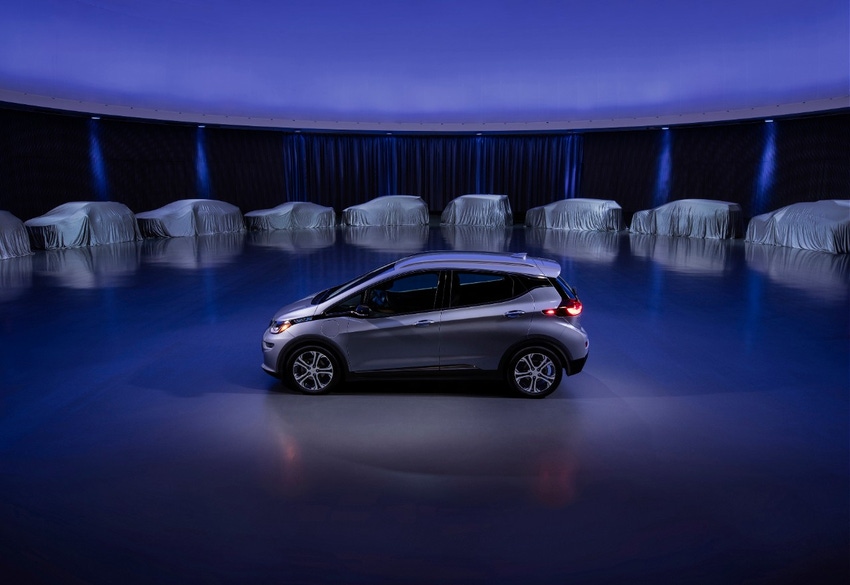GM to Produce 20 New Electric Cars by 2023
Future GM battery-electric vehicles will include coupes, sedans, crossovers, SUVs and possibly even pickup trucks.
October 3, 2017

General Motors raised the stakes in the auto industry’s ongoing competition to build more affordable, long-range electric cars this week, announcing it would roll out two more all-new EVs in the next 18 months, and 20 more by 2023.
The giant automaker said that the first two vehicles will be “based off learnings from the Chevrolet Bolt EV.” The others will include coupes, sedans, crossovers, and SUVs. GM told Design News that it would also not rule out the possibility of a pickup truck. To underscore its effort, GM released a photo including eight different vehicles silhouetted underneath drapes, clearly exhibiting different sizes and shapes. The silhouetted figures represent the array of pure, battery-powered cars that the company will release in the next five-and-a-half years, all designed from the ground, up.
|
GM released a photo with eight different vehicles silhouetted underneath drapes in the background, clearly exhibiting different sizes and shapes. The silhouetted figures represent the array of pure, battery-powered cars that the company will release in the next five-and-a-half years. (Source: General Motors) |
“The Bolt EV was the first, affordable, long-range all-electric vehicle,” said GM spokesman Kevin Kelly. “We’ve cracked the code. We know how to do it.”
GM’s statement comes at a time when much of the entrenched auto industry seems as if it is racing to make bigger and bigger announcements about electric cars. Today, Ford Motor Co. said it has formed an internal unit, called Team Edison, whose charter it is to accelerate development of electric vehicles, while forging partnerships with other auto manufacturers and suppliers. Similarly, Toyota Motor Corp. said last Thursday that it is teaming with Mazda Motor Corp. and with supplier Denso Corp. to “jointly develop basic structural technologies for electric vehicles.”
The announcements provide a broad signal that traditional automakers have accepted electrification, but it’s still clear that most of them are unsure how fast it will take place. Industry analysts, such as Navigant Research, have predicted that approximately 4% of vehicles sold worldwide in 2025 will be battery-electric. Other analysts, however, have forecast figures in excess of 20%.
“If you try to guess anything out to about 2030, your crystal ball will be pretty fuzzy,” Kelly told us.
Analysts today acknowledged that no one’s sure whether consumers, even the younger ones, will embrace pure electric cars. “Engineers are starting to see a pathway to electrification that maybe they didn’t see until recently,” noted Brett Smith, program director for the Center for Automotive Research (CAR). “The question is whether it’s just that the technology is advancing, or if it’s because the companies need to make these statements so they don’t get left behind on the public relations front.”
At CAR’s Management Briefings Seminars in August, many industry executives expressed skepticism about the near-term future for pure electric cars, Smith said. In 2016, only 0.4% of the new vehicles sold in the US were battery-electric. Even the much-publicized Chevy Bolt has turned lukewarm numbers, with just 11,670 sold through August, according to InsideEVs.
Smith said that part of the motivation for the recent spate of announcements is the industry’s need to keep up with Tesla, Inc. “Tesla has changed the game,” he noted. “In the past, the auto industry never talked about future product. Now, though, they realize they have to play the long-term game.”
Senior technical editor Chuck Murray has been writing about technology for 33 years. He joined Design News in 1987, and has covered electronics, automation, fluid power, and auto.
Code Quality Is Key to Securing the Connected Car
Join Jay Thomas, director of field engineering for LDRA, as he discusses the vulnerabilities of connected automobiles at the upcoming
About the Author(s)
You May Also Like


.jpg?width=300&auto=webp&quality=80&disable=upscale)

